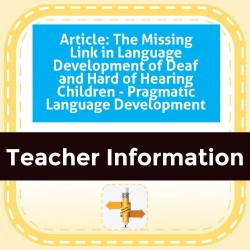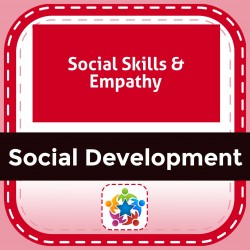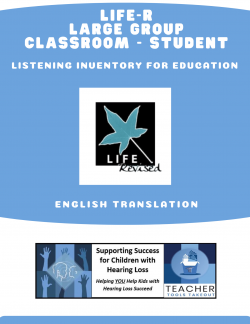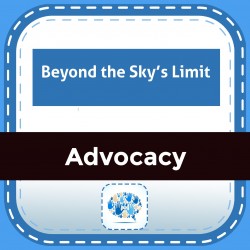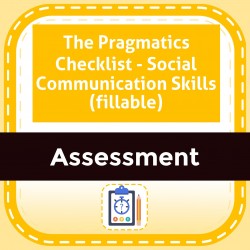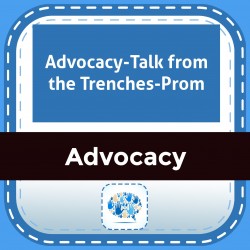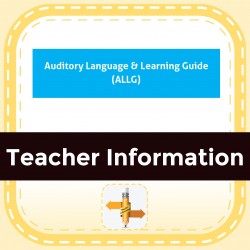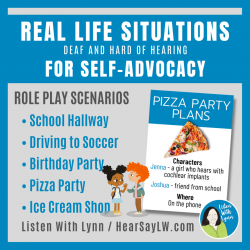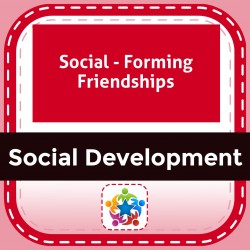Ability Levels
Categories
Resource Types
Age/Grade Range
CCSS
Anchor Standard
Speaking & Listening
Language
Reading
Advocacy - Talk from the Trenches BUNDLE
$ 395
Self-knowledge, self-acceptance and social acceptance are critical for a student's overall well-being. This bundle of teacher information, worksheets, and activities include a range of social topics f
...
rom understanding hearing loss to civil and legal rights. Students will acquire new vocabulary, use critical thinking skills to solve problems, and be offered opportunities for self-discovery and discussion. Information and activities are meant for advanced learners. Collected IDs in the BUNDLE: S0XTRN730, S0XSCI731, S0XSCI0732, S0XSOC0733, S0XSOC0734, S0XSOC0735, S0XSCI0736, S0XSCI0737, S0xADV0738.
Article: The Missing Link in Language Development of Deaf and Hard of Hearing Children - Pragmatic Language Development
$ 0
Informational handout that includes results of research on pragmatic language development for young children with hearing loss and intervention strategeis.
Social Skills & Empathy
$ 225
Feeling empathy for another person is the ability to share or understand his or her feelings. This article discusses how children learn empathy and provides instructional strategies and activities for
...
teaching students to respond with appropriate empathy.
Large Group Student LIFE
$ 4
This checklist is designed to be a pretest/post-test when a Classroom Amplification Distribution System (CADS or soundfield amplification) is used in a classroom in which large group instruction is pr
...
esented. It can be used with a selected subgroup of students, or all students can be asked to complete the checklist. Each student rates his/her general responsiveness during instruction on a 1-5 rating scale. Includes room for minimal comments. Results will be most valid for students in grade 4 or ages 9-10 and above.
Beyond the Sky’s Limit
$ 299
A collection of comic strips revealing troublesome situations for teens with hearing loss. Includes commentary on how each humorous situation might be resolved.20 more situations and scenarios that m
...
mix humor with compassion in negotiating social communication.More antics and advocacy for teens and tweens with hearing loss.
The Pragmatics Checklist - Social Communication Skills (fillable)
$ 395
Fillable version of checklist to screen for pragmatic language issues ages 2-7. By age 4 years, 43 of 45 items are typically communicated using complex language. Many children with hearing loss are 3
...
years delayed and continue to use 1-3 words rather than full sentences. Includes interpretation and intervention information.
Advocacy-Talk from the Trenches-Prom
$ 2
Engage teens in discussion and goal-setting for future success as a young adult with hearing loss. See BUNDLE at S0XSOC739.
Auditory Language & Learning Guide (ALLG)
$ 10
The Auditory Language & Learning Guide is an EXCELLENT informal evaluation tool for listening and language that can be used with students of any age and language ability. The 2 page checklist format e
...
asily allows the teacher to develop IEP goals based on identified student weaknesses in the 4 areas of audition/listening, receptive language, expressive language, and social communication. Skills can be rated as 'targeted', 'emerging', 'mastered' or 'previously assessed' and checked off by date achieved. This assessment tool can be used from year to year allowing instructors and parents to see growth in a students language and learning.
Self-Advocacy Role Play Real Life Connections
$ 7
This Self-Advocacy resource is a favorite of students who are deaf and hard of hearing. There are five situations to role-play where players assume the role of kids at school, at home, with peers, and
...
and in their community. They are all derived from situations of actual kids I've seen for therapy.Self-advocacy success requires knowledge, skills, and most importantly practice. These situations provide opportunities for kids to grapple with challenging situations and explore communication repair strategies within a supported environment. Included:★ Five Scenarios - Two Parts Each1. At School In The Noisy Hallway2. Driving To Soccer3. After the Birthday Party4. Pizza Party Plans5. At The Ice Cream Shop★ Self-Advocacy Coping Strategies:➼ Part One illustrates a communication breakdown when the studentuses Escape or negative strategies.➼ Part Two is the scenario again with the new Take Charge orpositive strategies.★ Talking Points➼ Provided to engage and support a discussion.No-Prep or Planning- For face-to-face sessions and in teletherapyDigital ResourceOptional: Print the role-play scenarios for the students★ Boom LearningThis Self Advocacy For Role Play is also available as a Boom Deck in the Listen With Lynn Boom Learning Store. To use Boom Cards, you must be connected to the internet.◈ ◈ ◈ ◈ ◈ ◈ ◈ ◈ ◈ ◈ ◈ ◈ ◈ ◈ ◈ ◈ ◈ ◈ ◈ ◈ ◈ ◈ ◈ ◈ ◈ ◈ ◈ ◈ ◈ ◈ CUSTOMER TIPS:➼ Questions? EMAIL ME before purchasing this resource or anytime later.♥ Sign-up HERE for the Listen With Lynn Emails♥ Let’s Connect:InstagramFacebookKeep up your good work. I am blessed to help along the way.Thanks so much!Lynn Wood
Social - Forming Friendships
$ 195
Explains that friendship is the only relationship we choose solely for the purpose of shared enjoyment. Includes instructional strategies and 2 worksheets.
 Your browser is out of date. For best experience switch to latest updated Browser.
Your browser is out of date. For best experience switch to latest updated Browser.
 Get Chrome
Get Chrome Get Edge
Get Edge Get Firefox
Get Firefox
